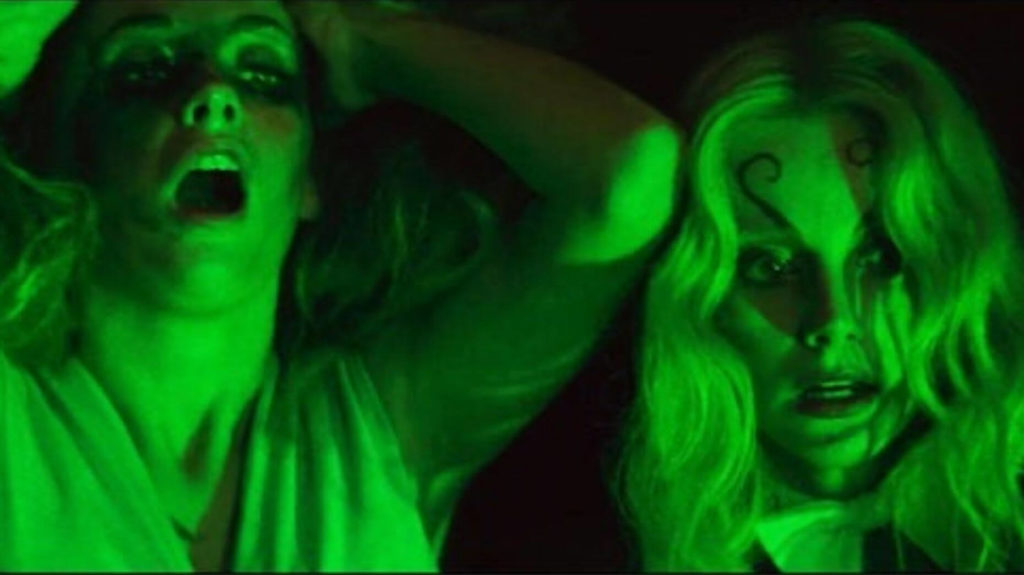
Double Feature: Death Game and Knock Knock
Death Game: Bad Times Ahead
Peter Traynor’s Death Game is a strange bird: the simple plot has financially successful father George Manning (Seymour Cassel) home alone while his wife rushes off to address an out-of-town emergency with one of their children. Cue a rainstorm that brings two soaked young women – Agatha (Sondra Locke) and Donna (Colleen Camp) – to his doorstep. Looking for help finding a friend’s house, the women quickly take George prisoner for a weekend of debauchery.
Very much of its time, Death Game’s opening-credits lay squonky synthesizer and children’s singing over a crayon-drawing montage of a happy family. The theme of the father being an important role model is laid bare in the lyrics, which – coupled with the ominous title – foreshadows the bad times to come.
Taking the “monstrous feminine” and applying it to a fateful weekend, Agatha and Donna’s reign of terror begins with a three-way hot-tub seduction, and goes through a bizarre second act that consists of infantile behavior while George is bound or otherwise constrained; a helpless bystander in a world turned upside-down.
Is the titular “death game” one of literal death, or perhaps just the figurative death of the nuclear family, diminishing the masculine as the dominant force in the household?
Exploitation Elements
The exploitation elements are in place: the sex scene goes on for minutes, with unabashed close-ups of bare flesh. The brief bout of resistance George shows toward the nubile bodies in his midst quickly gives way to temptation that turns to regret, as Agatha and Donna revert to a juvenile state the morning after.
This subverts the timeless conceit of many a porno flick: the fantasy fulfillment of two beautiful women guiding “one lucky guy” to climax, after which life goes on in a consequence-free manner. That there is no post-coital emotional obligation sweetens the scenario: all bodily fluids can be cleaned up well before the wife and kids return home.
But in Death Game, there’s sloppy eating habits, leaky ketchup bottles, and perverse games of dress-up. The women address George by name in nearly every bit of dialog, which gives their relationship a sick, infantile “daddy/daughter” feel. What’s interesting is that George, despite his best efforts, never gets the upper hand, and is reduced to a resigned, emasculated state for most of the run time.
Removed from Reality
The rhythm of Death Game is complemented by a few things: cinematographer David Worth’s use of stark lighting in the early sequences, which metamorphoses into a nauseated green tint in the final act. Similarly, Worth edits the picture with a jagged quality that throws the viewer consistently off-guard, finding discomfort in creepy close-ups of faces beaming with terror or impish glee. Through these methods, he underlines the characters’ descents into madness, giving the proceedings a surreal sheen that feels completely removed from reality by the time all is said and done.
Locke and Camp are equal parts maddening and fascinating as the sinister duo, committing in full to characters who are clearly unhinged yet, in their aim to teach a seemingly random sap a lesson, justified in their rampage. The performances, coupled with Worth’s technical contributions, make the viewer a believer in this absurd home invasion.
Another thing that distances Cassel from the action is the fact that the actor, unhappy with the project, refused to re-record his dialog in post. Therefore, his signature nasal voice is dubbed over by Worth. This complements the feeling of dissociation as the film ventures into its final act.
Knock Knock: Don’t Knock It
Years ago, I dismissed Eli Roth’s Knock Knock as a missed opportunity for the gore-obsessed filmmaker to do something different. This official remake of Death Game simply didn’t work for me.
That said, revisiting it as part of the Colonial Theatre’s Death Game double feature was an interesting experience that inspired a surprising re-assessment.
The plot is the same, adding a few character wrinkles: Evan (Keanu Reeves) is an architect, and his wife Karen (Ignacia Allamand) is a painter and sculptor. Genesis (Lorenza Izzo) and Bel (Ana de Armas) are the nubile beauties who show up at Evan’s door after his wife and kids leave for the weekend.
A Subtle Struggle
Knock Knock was an instance of a remake getting wider distribution than its predecessor: Death Game was wallowing in VHS obscurity when Roth’s film saw a VOD and limited theatrical release. With no point of comparison – and a fair dislike of Roth’s previous work – I shrugged off the effort.
Watching it right after Death Game, it’s interesting to observe Roth’s deliberate efforts to distinguish his film from Traynor’s. Most notably, the script (co-written by Roth, Nicolas Lopez, and Guillermo Amoedo) creates a near-unbearable build-up to the inevitable, allowing Evan more time with Genesis and Bel before succumbing to their seduction.
Whereas George Manning showed little restraint toward physical temptation, Evan – given extra gravity thanks to Reeves’ perpetual “good guy” purity – exhibits a subtle struggle to stay celibate as the women fawn over him in ways both understated (complimenting his record collection and DJ setup) and overt (stripping down and soaping up in the shower).
No Place to Hide
The jagged editing and deliberate lighting schemes of the ’77 film is traded for smooth camera movements (often stalking Evan through the corridors of his home) and starker lighting. Whereas Death Game seemed to have unknown secret horrors lurking in the shadows, Knock Knock gives unpleasant truths no place to hide. Both approaches work. Roth’s choice also helps establish a sense of geography when the action transitions from room to room.
A welcome change is the trade-off of 1977 synthesizers for a more traditional – but appropriate – thriller score. Roth also gets the best use out of The Pixies’ “Where Is My Mind” since Edward Norton and Helena Bonham Carter watched the collapse of financial history in Fight Club.
Psychological Unease
The filmmaker reconsiders the material and tone without changing the core parts, fixing elements that may be a bit dated in a way that made Dennis Iliadis’ Last House on the Left remake supersede its predecessor.
The vulgarity that permeates Roth’s prior films is present and accounted for (family photos vandalized with cartoon cocks and AIDS jokes), but the infantile nature of it all is keeping in sync not only with Genesis and Bel’s impishly childlike behavior, but the base masculine urges that inform Evan’s eventual infidelity.
There’s some suspense and, yes, intelligence in how Roth unspools the scenario. There’s a patience to the technique that builds a sense of psychological unease, and an undercurrent of dark humor running throughout. The notion of “indictment by passive viewership” is not as strongly felt here as in, say, Funny Games (either version), but the director should be commended for keeping his gorehound tendencies under control.
Un-PC Attitude
Reeves turns in a genuinely good performance here, making Evan a more proactive character than George Manning (despite his seemingly inescapable predicament). The arrested-development nature of Locke and Camp gives way to something more catlike and scheming with Izzo and De Armas, who escalate the notions of pedophilia in the ’77 film.
That said, neither film makes an overt bid for social relevance. In 2022, one could imagine a remake of Death Game coming from a major studio, with a checklist of notes to ensure the finished product is palatable to an undiscerning multiplex audience. Exploitation filmmaking of the 1970s had no time for such considerations; and, in the 7 years since Knock Knock, its un-PC attitude has been superseded by a climate of fan service…which may be the ultimate cinematic death game.
Rating for Death Game and Knock Knock: 3.5 out of 5 stars
The Plot Sickens: Jonny Numb drives headlong into Dashcam!
Crash Analysis Support Team

Jonny Numb
Jonny Numb (aka Jonathan Weidler) only disrobes before writing a review. He co-hosts The Last Knock horror podcast and occasionally pops up on Movies Films & Flix. His writing on non-horror cinema can be found periodically at The Screening Space.
THE LAST KNOCK horror podcast is a Crash Palace Productions’ featured show. Besides this site, you can find THE LAST KNOCK on iTunes and Spotify and more, with new shows posted every other Sunday at 9 PM ET.
Crash Palace Productions website design and creation from Brian Yount Digital Enterprises with banner and THE LAST KNOCK art from Palko Designs. Logo designs from Paul Belci. (Pearl movie still from A24.)
